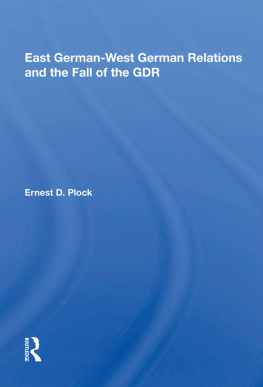Technological Change in the German Democratic Republic
Westview Replica Editions
The concept of Westview Replica Editions is a response to the continuing crisis in academic and informational publishing. Library budgets for books have been severely curtailed. Ever larger portions of general library budgets are being diverted from the purchase of books and used for data banks, computers, micromedia, and other methods of information retrieval. Interlibrary loan structures further reduce the edition sizes required to satisfy the needs of the scholarly community. Economic pressures on the university presses and the few private scholarly publishing companies have severely limited the capacity of the industry to properly serve the academic and research communities. As a result, many manuscripts dealing with important subjects, often representing the highest level of scholarship, are no longer economically viable publishing projectsor, if accepted for publication, are typically subject to lead times ranging from one to three years.
Westview Replica Editions are our practical solution to the problem. We accept a manuscript in camera-ready form, typed according to our specifications, and move it immediately into the production process. As always, the selection criteria include the importance of the subject, the works contribution to scholarship, and its insight, originality of thought, and excellence of exposition. The responsibility for editing and proofreading lies with the author or sponsoring institution. We prepare chapter headings and display pages, file for copyright, and obtain Library of Congress Cataloging in Publication Data. A detailed manual contains simple instructions for preparing the final typescript, and our editorial staff is always available to answer questions.
The end result is a book printed on acid-free paper and bound in sturdy library-quality soft covers. We manufacture these books ourselves using equipment that does not require a lengthy make-ready process and that allows us to publish first editions of 300 to 600 copies and to reprint even smaller quantities as needed. Thus, we can produce Replica Editions quickly and can keep even very specialized books in print as long as there is a demand for them.
About the Book and Author
Technological Change in the German Democratic Republic
Raymond Bentley
Focusing on East Germanys capacity to innovate and diffuse technology, this book sheds light on the technological gap that has developed between the two Germanies. Dr. Bentley compares the sophistication of GDR and FRG technology in different industrial branches, evaluates the strengths and weaknesses of the GDRs research and development system, compares the R&D effort of the two Germanies, and discusses the government policies that affected technological change in GDR industry from 1945 to 1975. He identifies and analyzes hindrances to research, innovation, and diffusion in the fields of planning, organization, economic stimulation, and ideology, and looks at the formation of interest groups. He also compares evidence from the GDR with data from other countries, including the USSR.
Dr. Raymond Bentley wrote this study as a guest researcher of the Abteilung fuer Wissenschaftsforshung (Department of Science Studies) at the University of Ulm, Federal Republic of Germany.
First published 1984 by Westview Press
Published 2019 by Routledge
52 Vanderbilt Avenue, New York, NY 10017
2 Park Square, Milton Park, Abingdon, Oxon OX14 4RN
Routledge is an imprint of the Taylor & Francis Group, an informa business
Copyright 1984 Taylor & Francis
All rights reserved. No part of this book may be reprinted or reproduced or utilised in any form or by any electronic, mechanical, or other means, now known or hereafter invented, including photocopying and recording, or in any information storage or retrieval system, without permission in writing from the publishers.
Notice:
Product or corporate names may be trademarks or registered trademarks, and are used only for identification and explanation without intent to infringe
Library of Congress Cataloging in Publication Data
Bentley, Raymond.
Technical change in the German Democratic Republic.
(A Westview replica edition)
Includes bibliographical references.
1. Technology and state--Germany (East) 2. Research,
Industrial--Germany (East) I. Title.
T26.G42B46 1984 338.9431 84-2262
ISBN 13: 978-0-367-28959-1 (hbk)
Contents
, Christopher Freeman
Since the 1950s interest has grown in the science-technology systems of Eastern Europe. Especially, of course, the R and D effort of the Soviet Union has been the subject of great curiosity and speculation, and of some serious investigation. The Birmingham University Centre for Russian and East European Studies has been responsible for several outstandingly good studies of the Soviet R and D and innovation systems. Yet very little has been published on the science-technology systems of the other East European countries apart from propagandist tracts and official statistics which are extremely difficult to interpret.
The divergence of West and East European statistical systems affects many aspects of economic analysis, since it includes such fundamental concepts as GNP. International organisations have made praiseworthy efforts to reconcile the differing international standards and to produce some comparable statistical series. However, in the case of R and D statistics and other related indicators of scientific and technical inputs and outputs, these efforts have proved stillborn. Neither UNESCO nor the Economic Commission for Europe of the United Nations were able to overcome the formidable political and scientific problems when they attempted to produce common definitions and standards in the 1960s.
This has meant that in practice the attempt to make valid comparisons between East and West Europe or with the United States has been left to serious academic investigators and the intelligence services of the various powers. The intelligence services do not often publish their estimates and when they do, they must be regarded as highly suspect, as well as of low quality from a scientific point of view. In the military field there are obvious pressures to overstate the scale of enemy activity in order to justify a greater arms build-up. Much of the spurious missile gap propaganda which preceded Kennedys election and that of Reagan was based on pseudo-statistics of this type.
This means that a very great responsibility devolves upon a handful of serious scholars in the West and East who are ready to accept the task of attempting to make independent and reasonably objective estimates and comparisons. Even without all the political and ideological pressures and confusion, this task would be difficult enough. There are genuine difficulties in the measurement of inputs into the science-technology system and in the definition of what constitutes research and development and what should be defined as related scientific and technical activities. The West European countries have chosen to define R and D rather narrowly and the Frascati definitions of what constitutes R and D exclude such activities as geological exploration, information services, detail design and engineering or market research.
Largely following the Soviet definitions, the East European countries, including the GDR, measure a much wider range of scientific and technical activities and services. This has many great advantages and it is to be hoped that ultimately, when the present wave of false economies in government statistical services has blown over, the OECD countries will also measure these activities. In the meantime anyone who wishes to make serious comparisons between West and East Europe, as opposed to propaganda tricks, must find some way to adjust the East European statistics to the Frascati definitions by deducting the non R and D components. The Birmingham Centre pioneered in these estimates and with the unofficial cooperation of various East European scholars, the techniques have been greatly improved.





![[美]乔恩·本特利(Jon Bentley) 著 - 编程珠玑(第2版·修订版)](/uploads/posts/book/275588/thumbs/jon-bentley.jpg)



